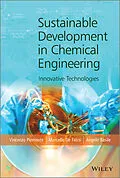Sustainable development is an area that has world-wide appeal,
from developed industrialized countries to the developing world.
Development of innovative technologies to achieve sustainability is
being addressed by many European countries, the USA and also China
and India. The need for chemical processes to be safe, compact,
flexible, energy efficient, and environmentally benign and
conducive to the rapid commercialization of new products poses new
challenges for chemical engineers.
This book examines the newest technologies for sustainable
development in chemical engineering, through careful analysis of
the technical aspects, and discussion of the possible fields of
industrial development.
The book is broad in its coverage, and is divided into four
sections:
* Energy Production, covering renewable energies,
innovative solar technologies, cogeneration plants, and smart
grids
* Process Intensification, describing why it is important
in the chemical and petrochemical industry, the engineering
approach, and nanoparticles as a smart technology for
bioremediation
* Bio-based Platform Chemicals, including the production
of bioethanol and biodiesel, bioplastics production and
biodegradability, and biosurfactants
* Soil and Water Remediation, covering water management
and re-use, and soil remediation technologies
Throughout the book there are case studies and examples of
industrial processes in practice.
Autorentext
Vincenzo Piemonte, University of Rome "La Sapienza", Italy
Marcello De Falco, University Campus Bio-Medico of Rome, Italy
Angelo Basile
ITM-CNR, Rende (CS), Italy
Zusammenfassung
Sustainable development is an area that has world-wide appeal, from developed industrialized countries to the developing world. Development of innovative technologies to achieve sustainability is being addressed by many European countries, the USA and also China and India. The need for chemical processes to be safe, compact, flexible, energy efficient, and environmentally benign and conducive to the rapid commercialization of new products poses new challenges for chemical engineers.
This book examines the newest technologies for sustainable development in chemical engineering, through careful analysis of the technical aspects, and discussion of the possible fields of industrial development.
The book is broad in its coverage, and is divided into four sections:
- Energy Production, covering renewable energies, innovative solar technologies, cogeneration plants, and smart grids
- Process Intensification, describing why it is important in the chemical and petrochemical industry, the engineering approach, and nanoparticles as a smart technology for bioremediation
- Bio-based Platform Chemicals, including the production of bioethanol and biodiesel, bioplastics production and biodegradability, and biosurfactants
- Soil and Water Remediation, covering water management and re-use, and soil remediation technologies
Throughout the book there are case studies and examples of industrial processes in practice.
Inhalt
List of Contributors xiii
Preface xv
1. Sustainable Development Strategies: An Overview 1
Vincenzo Piemonte, Marcello De Falco, and Angelo Basile
1.1 Renewable Energies: State of the Art and Diffusion 1
1.2 Process Intensification 4
1.3 Concept and Potentialities of Bio-based Platforms for Biomolecule Production 8
1.4 Soil and Water Remediation 13
Acknowledgement 18
References 18
2. Innovative Solar Technology: CSP Plants for Combined Production of Hydrogen and Electricity 25
Marcello De Falco
2.1 Principles 25
2.2 Plant Configurations 28
2.3 Mathematical Models 33
2.4 Plant Simulations 39
2.5 Conclusions 46
Nomenclature 47
References 48
3. Strategies for Increasing Electrical Energy Production from Intermittent Renewables 51
Alessandro Franco
3.1 Introduction 51
3.2 Penetration of Renewable Energies into the Electricity Market and Issues Related to Their Development: Some Interesting Cases 55
3.3 An Approach to Expansion of RES and Efficiency Policy in an Integrated Energy System 57
3.4 Analysis of Possible Interesting Scenarios for Increasing Penetration of RES 62
3.5 Analysis of a Meaningful Case Study: The Italian Scenario 66
3.6 Analysis and Discussion 74
3.7 Conclusions 75
Nomenclature and Abbreviations 76
References 77
4. The Smart Grid as a Response to Spread the Concept of Distributed Generation 81
Yi Ding, Jacob Østergaard, Salvador Pineda Morente, and Qiuwei Wu
4.1 Introduction 81
4.2 Present Electric Power Generation Systems 82
4.3 A Future Electrical Power Generation System with a High Penetration of Distributed Generation and Renewable Energy Resources 83
4.4 Integration of DGs into Smart Grids for Balancing Power 86
4.5 The Bornholm System - A "Fast Track" for Smart Grids 91
4.6 Conclusions 92
References 93
5. Process Intensification in the Chemical Industry: A Review 95
Stefano Curcio
5.1 Introduction 95
5.2 Different Approaches to Process Intensification 96
5.3 Process Intensification as a Valuable Tool for the Chemical Industry 97
5.4 PI Exploitation in the Chemical Industry 100
5.5 Conclusions 113
References 113
6. Process Intensification in the Chemical and Petrochemical Industry 119
Angelo Basile, Adolfo Iulianelli, and Simona Liguori
6.1 Introduction 119
6.2 Process Intensification 120
6.3 The Membrane Role 122
6.4 Membrane Reactor 124
6.5 Applications of Membrane Reactors in the Petrochemical Industry 128
6.6 Process Intensification in Chemical Industry 139
6.7 Future Trends 141
6.8 Conclusion 142
Nomenclature 143
References 143
7. Production of Bio-Based Fuels: Bioethanol and Biodiesel 153
Sudip Chakraborty, Ranjana Das Mondal, Debolina Mukherjee, and Chiranjib Bhattacharjee
7.1 Introduction 153
7.2 Production of Bioethanol 155
7.3 Biodiesel and Renewable Diesels from Biomass 166
7.4 Perspective 172
List of Acronyms 172
References 173
8. Inside the Bioplastics World: An Alternative to Petroleum-based Plastics 181
Vincenzo Piemonte
8.1 Bioplastic Concept 181
8.2 Bioplastic Production Processes 183
8.3 Bioplastic Environmental Impact: Strengths and Weaknesses 186
8.4 Conclusions 195
Acknowledgements 196
References 196
9. Biosurfactants 199
Maria Giovanna Martinotti, Gianna Allegrone, Massimo Cavallo, and Letizia Fracchia
9.1 Introduction 199
9.2 State of the Art 200
9.3 Production Technologies 205
9.4 Recovery of Biosurfactants 212
9.5 Application Fields 213
9.6 Future Prospects 225
References 225
10. Bioremediation of Water: A Sustainable Approach 241
Sudip Chakraborty, Jaya Sikder, Debolina Mukherjee, Mrinal Kanti Mandal, and D. Lawrence Arockiasamy
10.1 Introduction 241
10.2 State-of-the-Art: Recent Development 242
10.3 Water Management 247
10.4 Overview of Bioremediation in Wastewater Treatment and Ground Water Contamination 250
10.5 Membrane Separation in Bioremediation 252
10.6 Case Studies 256
10.7 Conclusions 260
Lis…
